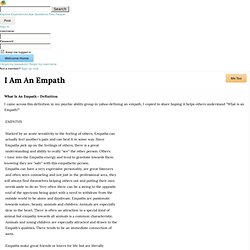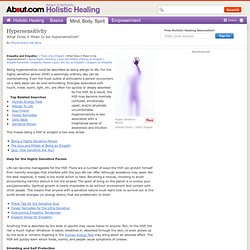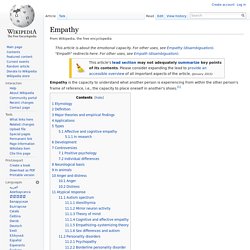

What Is An Empath.- Definition : I Am An Empath Story. I came across this definition in my psychic ability group in yahoo defining an empath, I copied to share hoping it helps others understand "What is an Empath?

" Marked by an acute sensitivity to the feeling of others, Empaths can actually feel another's pain and can heal it in some way. Since Empaths pick up on the feelings of others, there is a great understanding and ability to really "see" the other person. Others > tune into the Empaths energy and tend to gravitate towards them knowing they are "safe" with this empathetic person. Empaths can have a very expressive personality, are great listeners and often seen counseling and not just in the professional area, they will always find themselves helping others out and putting their own needs aside to do so. Very often there can be a swing to the opposite end of the spectrum being quiet with a need to withdraw from the outside world to be alone and daydream.
Hypersensitivity - What it Means to be Hypersensitive - Help for Empaths. Empaths and Empathy: | Traits of an Empath | What Does it Mean to be Hypersensitive?

| Being Highly Sensitive | Joys and Pitfalls of Being an Empath | Empath Remedies | Empathic Healer | Quiz: Are You an Empath? | Support for Empaths Being hypersensitive could be described as being allergic to life. For the highly sensitive person (HSP) a seemingly ordinary day can be overwhelming. Even the most subtle of stimulants a person encounters on a daily basis can be over-stimulating. Help for the Highly Sensitive Person Life can become manageable for the HSP. Shielding and Self Protection Self protection and shielding are tools that help make living among harmful stimulants. Sensitivity to Foods and Smells Luckily, everyone has control over what food is eaten. Healers and Hypersensitivity A healer with empathic tendencies can use this ability as a diagnostic tool, helping him to better relate to the symptoms and pain of his clients. Being an Empath - The Joys and Pitfalls of Being an Empath.
Updated February 20, 2016.

Empaths and Empathy: | Traits of an Empath | How to Spot an Empath | What Does it Mean to be Hypersensitive? | Being Highly Sensitive | Joys and Pitfalls of Being an Empath | Empath Remedies | Empathic Healer | Quiz: Are You an Empath? | Support for Empaths Can you feel what others around you are feeling? Are you sensitive to your surroundings? Curse or Blessing? Being an empath is a double edged sword. Some people would love to learn how to be more empathic, while others would love to learn how to retain the best parts of that skill, while managing the more difficult aspects. An Empath Can Be a Real Chameleon I have this theory that people become empaths as a way to stay safe in their world. Self Care or Self Detriment? Empaths tend to care take their environment as a way to care take themselves. I know first hand, because I am an empath. So what are we to do about this quandary? Essential Practices for Empaths Develop Your Shield Body Center of Being. Empathy. Empathy is the capacity to understand what another person is experiencing from within the other person's frame of reference, i.e., the capacity to place oneself in another's shoes.[1] Etymology[edit] The English word is derived from the Ancient Greek word ἐμπάθεια (empatheia), "physical affection, passion, partiality" which comes from ἐν (en), "in, at" and πάθος (pathos), "passion" or "suffering".[2] The term was adapted by Hermann Lotze and Robert Vischer to create the German word Einfühlung ("feeling into"), which was translated by Edward B.

Titchener into the English term empathy.[3][4] Alexithymia (the word comes from the Ancient Greek words λέξις (lexis, "diction", "word") and θυμός (thumos, "soul, as the seat of emotion, feeling, and thought") modified by an alpha-privative, literally meaning "without words for emotions"), is a term to describe a state of deficiency in understanding, processing, or describing emotions in oneself.[5] Definition[edit] Applications[edit] Types[edit]